
Ikamvanites don’t let a little thing like a petrol bomb derail us from our big vision. In fact, like Zukile and Mphumzi say in the short film about the Freedom Day attack, more power to us!
On 1 May, we spent the day at TSiBA brainstorming the first big challenge for sustainably scaling the IkamvaYouth model across the country: Where’s the $$ going to come from so that there can be an IkamvaYouth branch at every library, community centre and university campus that wants one?
Freda Grey generously volunteered her time, wisdom and expertise to facilitate (and challenge!) the stretching of imaginations as far as our risk-averse temperaments would allow. Natcom members (Andrew, Khona, Zoe, Nombu, Nico and I), board members (Leigh and Colin) and branchcom members (Phillip and Naledi), as well as one of our advisors (Eugene Daniels, the District Director of Metropole South) brainstormed numerous income opportunities and identified the ones we’d like to develop further as potential business cases.
We’ve set up a study group on the Peer-to-Peer University website for keeping the conversation going, and invite everyone with insight, opinions or ideas to get involved and contribute to the development of our strategy for sustainable scale.
The day ended on a sombre note with Eugene describing the challenges that the Education crisis presents. He noted IkamvaYouth’s innovative approach, track record and potential for scale and emphasised the urgency for reaching significantly larger numbers of learners. Watch this space or get involved in this one!
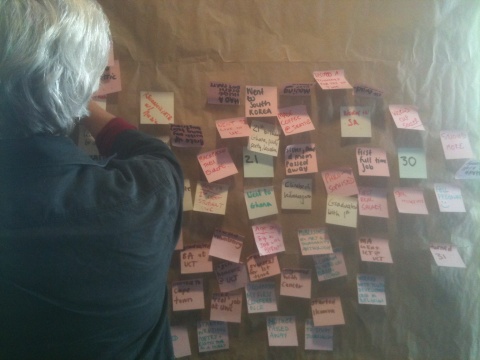

The Masiphumelele Drama Club wowed an audience at the book launch of Broken Promises on Saturday 14th May. A special request was made for the 4 Ikamvanites to perform a scene from the new book that is making waves in teen literature in South Africa.
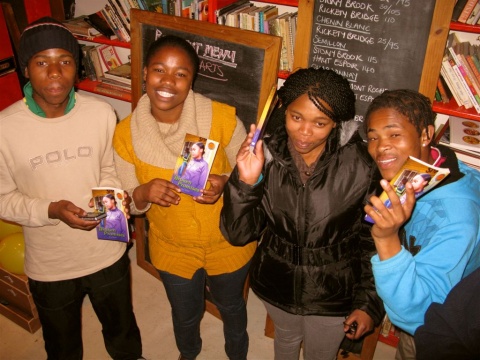
The new book is part of the Harmony High series that has been launched by Cover2cover books (www.cover2cover.co.za). The aim of the books are to excite young people in South Africa by providing relevant and applicable literature, particularly aimed at black youth. A culture of reading is paramount for South Africa if youth are to develop into the leaders that are so needed. Broken Promises and the team make a huge step toward making this happen.
The Ikamvanites have responded amazingly to the book and have spent hours engrossed in the teenage trials of Ntombi. The dramatization of the scene was hugely popular with the Ikamvanites and the Masi community at the initial launch. The ‘Company of players’ then went on to Kalk Bay Books and then to the Franschoek Literary Festival.
‘Their presence added something really special to the launch, and makes us belief that we really are on the right path toward creating a community of readers.’ Author Ros Haden shared her thoughts at the launch.
The learners did not display any nerves and performed exceptionally well; addressing real issues with an added humour. There are prospects to take this further and to perform in schools around the area. The Broken Promises fan club must grow and certainly will, if the Masi Ikamvanites are anything to go by!
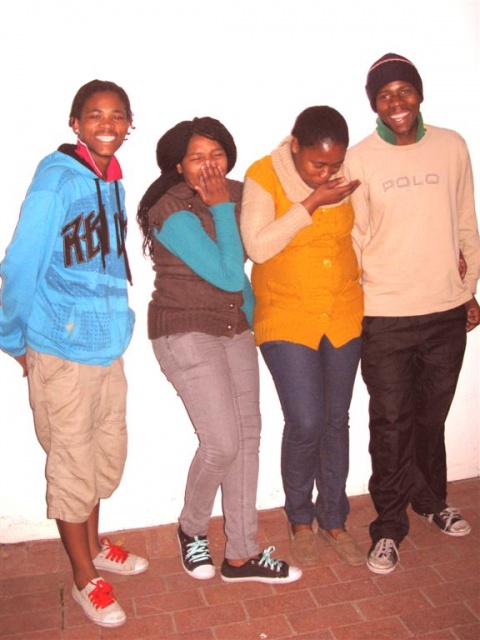

Thanks to the generosity of donors and bidders the IkamvaYouth Foodie Auction raised R48,150 for IkamvaYouth’s holiday programmes.
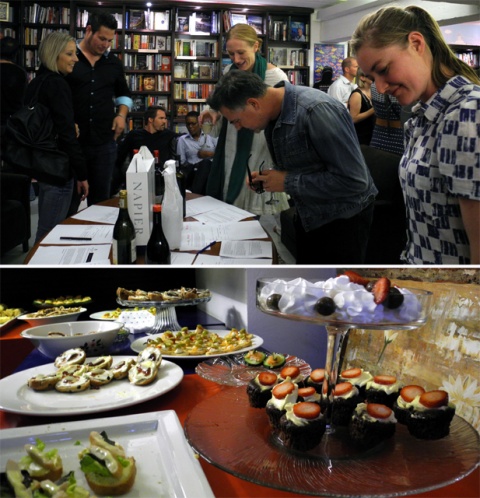
Those who were at The Book Lounge on Thursday 24th March, and those who have seen the documentary about IkamvaYouth, or seen their work in action will realise the effect these programmes have on township youth. To raise R48,150 toward the holiday programmes is a great contribution to these programmes.
At 6pm the wonderful store on Roeland Street started filling up. With bidders perusing the lots downstairs, whilst umming and ahhing, and making strategic bids in the silent auction. Upstairs was where the action took place. After a small talk from Ikamvanite and board member Thobela Bixa and brief screening of the IkamvaYouth film, everyone was ready for the live auction to commence!
Rob Van Vuuren joined the party and seemed to persuade, coax, and even force people to part with their hard earned cash, with promises of karma and a great sex life! It seemed to do the trick. The generosity of bidders was astounding; hands being thrust in the air repeatedly and simultaneously, in a crazy modern dance.
Conrad Hicks stood in shock as his iron pan crept up and up to reach a total of R2100. The Soceiti Bistro 3 day package shot up to R4400, and Queen of Tarts promise of a cake became entangled in an intense bidding war, resulting in a monumental bid of R2600.
It was a brilliant night, with just the right amount of fun and frivolity and all for a great cause. The total amount raised on the night was R48,150, which will contribute to 3 June/JulyWinter School’s at the Western Cape branches, reaching approximately 300 learners with career guidance, tutoring, excursions, workshops, and general new and exciting activities.
Huge thanks to the people who made the Foodie Auction happen: Carrington Broeman, Steffie Roehrs and Zoe Mann. And to Rob for volunteering to prise money from peoples purses!
On behalf of the learners, the staff and the volunteers who helped with the auction we thank all who attended, and all the donors for making the IkamvaYouth Foodie Auction a real success.
Please see the YuppieChef coverage of this event at http://www.spatula.co.za/ikamvayouth-foodie–auction/

“Social entrepreneurship is an evolving space, and yet one of the most profound developments in our world today. Simply put, social entrepreneurship is about correcting an accepted social imbalance for some economic gain. I can just hear the last part of my statement still buzzing around your heads: “for some economic gain?” to which I say absolutely “for economic gain”.
Put differently, social entrepreneurship is merely shifting resources out of an area of lower productivity to higher productivity to yield greater social benefit, where the nature of the profit, be it financial or otherwise, accrues to beneficiaries typically previously excluded from the profits and benefits. This creates a more equitable equilibrium, which is dependent on there being economic benefits for the sustainability of this entrepreneurial activity.
We, Social Entrepreneurship Certificate Programme (SECP) students, couldn’t have undertaken this programme at a more relevant time. The current unrest in North Africa points, among other things, to this very imbalance which social entrepreneurs seek to address. This can also be seen right here at home with the service delivery protests that are occurring more regularly. And as people involved in the development space, it forces us to think beyond the immediate scope of our work to the wider needs within our society. One is forced to ask the question: How effectively does my work address the socially acceptable imbalances in our society today?
The unrest in North Africa also demands that business at large start to ask the same question because when the imbalances reach a tipping point and ordinary citizens’ patience wears thin it is not only the development practitioners who will be affected, all of us, all of society will be affected. Thus we need to start having conversations now and we need to begin to find solutions today. But we can’t all be social entrepreneurs.
However, business can assist social entrepreneurs to begin to devise and bring to life innovative solutions, and to roll out solutions to these problems – this is an equally important role that business can take in an attempt to create social equilibrium within society.
Credit must be given to South African business for their increased spend and focus on social responsibility, but this needs to be taken further. Social entrepreneurs bring forth sustainable solutions that often have a measurable impact and are scalable in nature, and hence have far reaching effects. As a result, investments into social entrepreneurship have a far wider reaching impact than mere corporate social investment (CSI) spend. This is by no means to discredit current CSI disbursements where there remains a need. But this forces business to start thinking more about how their money, their investment, can have greater social impact.
Social entrepreneurs are by the very nature, change agents. The SECP enabled us to better understand this role, and to become more effective and efficient in the manner of change we bring about. One of the most important lessons learnt, as budding social entrepreneurs and development practitioners, is what Jim Collins, author of the book, Good to Great, refers to as ‘Level 5 Leadership’, which is two things. Firstly, the humility to know and understand that the change we wish to bring about is bigger than our ego, and thus the mission is bigger than ourselves, in other words, that we are building a legacy which will outlive us and outgrow us while attracting the right calibre of person to take the mission to a higher level. Secondly, insight, or lessons learnt, is about having the professional will to never lose sight of the goal and mission of our work, especially when the going gets tough, which it often does, and seemingly easy solutions present themselves which would benefit the individual rather than the organisation and the mission at hand.
I dare say, this is the type of leadership required of South Africa if the innate potential of our country is to bring forth the fruits of democracy that are so desperately needed and longed for by each and every South African citizen.
On behalf of the SECP class of 2010, I extend a heartfelt thanks to the Gordon Institute of Business Science (GIBS), and especially our course convener, Amy Tekie, coordinator, Dineo Lengane, and the team of lecturers. GIBS has enabled us to not only become more effective and efficient at what we do as development practitioners and budding social entrepreneurs, but through this course we have been given a platform to grow and to confidently add our voice to the conversations on where our country needs to get to and how that can happen.
We are the leaders that South Africa needs, the SECP class of 2010 knows that a heavy duty falls upon us now to fulfill the promises enshrined in the constitution for every South African to enjoy and I quote directly from the South African Constitution:
- Heal the divisions of the past and establish a society based on democratic values, social justice and fundamental human rights;
- Lay the foundations for a democratic and open society in which government is based on the will of the people and every citizen is equally protected by law;
- Improve the quality of life of all citizens and free the potential of each person; and
- Build a united and democratic South Africa able to take its rightful place as a sovereign state in the family of nations.
In closing I would like to share a quote from an unknown author, “Excellence is the result of caring more than others think is wise, risking more than others think is safe, dreaming more than others think is practical and expecting more than others think is possible.”

– This is an extract of the closing address made by Gqibelo Dandala, one of the 30 students to graduate in the Social Entrepreneurship Certificate Programme (SECP) at the Gordon Institute of Business Science, University of Pretoria. The graduation ceremony was held on 9 March 2011. Gqibelo Dandala is founder and CEO of the Future of the African Daughter Project. Article submitted by Ann Bown, SECP lecturer.

IkamvaYouth is having a FOODIE AUCTION. Have a look at the:
foodie_auction_catalog.pdf
…and while the days away deciding what to bid on!
Ever wanted: A dinner for two at that you-have-to-book-a-year-ahead restaurant? A private cooking session for you and a friend with one of Cape Town’s top chefs? To learn how to make chocolate ttruffles? A backstage pass to a busy restaurant kitchen, the real story all unconfidential? All those wish items from Yuppiechef to kickstart your gourmet kitchen?
On the 24th March at the Book Lounge, 71 Roeland Street at 18.00 come along to the IkamvaYouth Foodie Auction and have the exlcusive opportunity to bid and win all these things and many more. An auction of exuberant, exceptional and highly erudite taste hosted by comedian Rob Van Vuuren.

Come and enjoy ALL this, with one goal in mind: raising awareness and funds for IKAMVAYOUTH
All the profit from this event will be used during IkamvaYouth’s Winter School’s and excursions for Gold learners. IkamvaYouth values commitment over anything else and to incentivize the committment of the learners we reward the top attendees with excursions and events; museum visits, to beach clean ups, to documentary festivals. It is important to recognise these learners’ commitment. The funds raised will help to make these excursions a regular occurence and really encouarge the learners full commitment to the programme.
The Winter Schools take place at every branch and support the other programmes in an intensive 2 week fun filled extravaganza. Check out the blog posts from the 2010 Winter Schools. Students participate in career guidance, tutoring, entrepreneurship programmes, drumming, dancing, photography, and acting workshops, and educational excursions. This 2 week period culminates in the IkamvaYouth Talent Show!



will all be there, and so should you!
Other sponsors include:




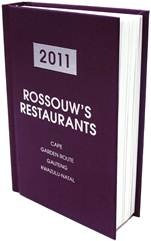



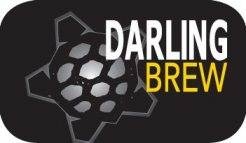



 The Kitchen and Richard Chamberlain are also supporting this event.
The Kitchen and Richard Chamberlain are also supporting this event.
So come and support IkamvaYouth and bid on all the amazing deals that are on offer on 24th March at the Book Lounge!

The following is an outline of the successes and obstacles experienced over the course of the four months that we spent working with 11th grade learners at IkamvaYouth-Makhaza Branch. First, it is important to note that we (my project partner Jonathan Wang, the learners, and myself) set out to accomplish a set of tasks that were unique, demanding, both technically and intellectually, and progressive from an educational perspective—such an approach is representative of IkamvaYouth as a whole, be that as organization, an idea, or as a group of wonderful people. As a result, we were bound to have a certain degree of success with our project no matter the obstacles we faced.
Our approach to the project was multifaceted and as such, sought multiple outcomes and objectives. Generally speaking, the focus of the project was to work with Ikamva learners in the testing of flexible, low-cost, open-source mapping techniques, which included hand-held GPS devices, digital cameras, and www.openstreetmap.org, to produce detailed street-level maps of areas around Khayelitsha—namely the shops along Landsdowne Road at R310 and Zwelitsha. More importantly, the focus of the project was to introduce learners to discussions of maps and their uses along with lessons on photographic techniques in order to get students to engage critically with their spatial environments—to begin to think about their neighborhoods as a network of roads and buildings that had relationships with one another, often mediated by concepts such as formality and informality. We also wanted to use the project as a way to introduce new technologies and software, such as Google Earth and Photosynth, to learners to try to provide them with a sense of how cutting-edge technologies are shaping the world. In doing so, we hoped that learners would have their minds opened, if only slightly, to the limitless possibilities that computers and science present us in the modern age.
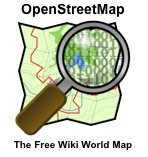
The first objective represents my research as a Visiting Scholar at the University of Cape Town. I am working with the Cape Urban Observatory Project to design and develop mapping techniques capable of efficiently and effectively mapping informal communities. Along with the project in Makhaza, I am working to map areas of Delft as well.
One of the main reasons we reached out to Ikamva to collaborate on this project was the fact that Ikamva learners come from the kinds of neighborhoods that our work seeks to explore. A central object of our work is to further the ends of community-based, participatory mapping as a means to promote community-driven development. As such, it was of great interest to us to try to involve learners in the scientific processes that produces authoritative information about the communities they live in. In terms of getting access to the areas to map and of getting learners involved in doing the actual mapping, we were quite successful. We were able to conduct the kind of tests we needed with equipment we had, and to this end, S’bu and Sinethemba (two of Makhaza Branch’s most dedicated tutors) were absolutely essential. They helped Jonathan and I navigate the neighborhoods of Khayelitsha, as well as capture the attention and imagination of the learners. Needless to say, I learned a great deal from the both of them about life in South Africa, life in the townships, and about the desire to overcome the obstacles to education that are presented a person as a result. For my education on these topics I am certainly indebted.
In terms of engaging with students, which represents the sort of second and third objectives to the project, I think we were pretty successful. Students were certainly interested in the digital cameras and immediately we saw them as a means to incentivize the actual work part of the mapping. We were able to design a couple of lessons that allowed learners to take the cameras home with them and use them to capture imagery of their neighborhoods to help with the map. They were all certainly keen because this also meant that they could use them to take pictures of their friends and families. We were able to project the imagery they took of their neighborhoods to discuss mapping and composition techniques, as well as concepts of mapping as a scientific approach, before going to do our field work. These in class exercises helped students stay engaged with the project material when they weren’t using the cameras or GPS devices in the field. We were also able to provide learners with DvD’s with their pictures and this gave learners a direct by-in to the project above the actual work itself.
Once in the field, things were always a little more challenging because as researchers we have to come in contact with the real world and doing so in Khayelitsha can be particularly difficult. This is where the majority of our obstacles occured. Language and cultural barriers alone between us as project leaders, the learners, and the community writ large presented certain obstacles to communication at times.
A second sort of related issue was the conspicuousness of the cameras while doing field work. They were often a source of confusion for residents of the community because many assumed us to be taking pictures of them to sell. Though we were able to explain to most people what we were doing, an improvement on this project would be to use GPS enabled cell phones that have a camera. That way we could collect image and GPS data while appearing less invasive to the community.
Over the next few months my project partner and I will be developing OpenSettlements.org which will be home to the maps and data we produced here while working at IkamvaYouth. We hope to explore the possibility of a map-based multimedia project using GPS enabled phones sometime next year, so that future learners can add to and build on the base-map data that the 11th graders helped create.
Ryan Bosworth
Visiting Scholar, University of Cape Town






























 Lloyd Lungu
Lloyd Lungu